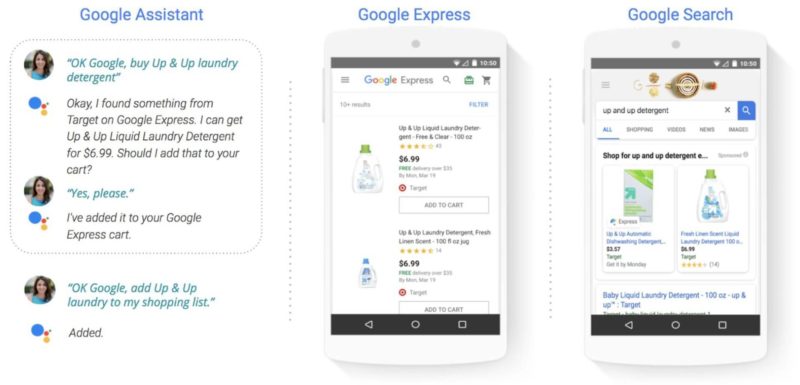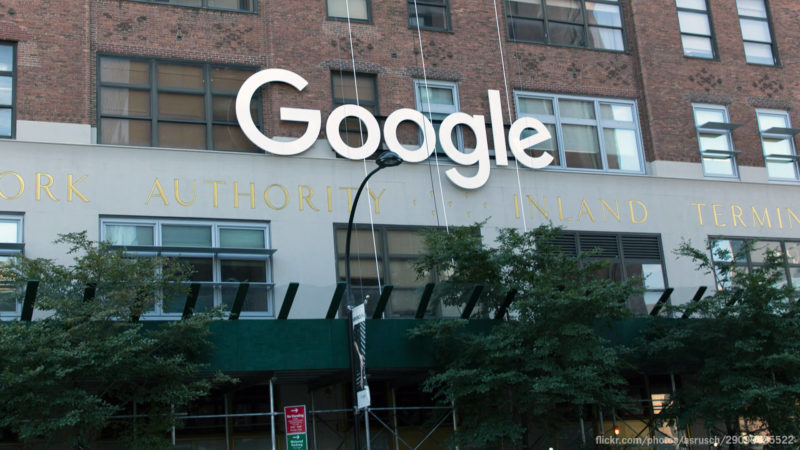Google Shopping Actions: The new cost-per-sale, unified shopping program on Search, Assistant & Express
In its answer to Amazon, Google's new umbrella program will extend existing relationships with retailers and enable universal checkout across platforms and devices.
Google has been working on retail challenges for some time. The problems: (1) how to make mobile shopping from its properties like Search faster; (2) how to maintain market share for product search in a splintering mobile landscape of apps and digital assistants; and (3) how to compete against Amazon, the number one threat to product search originating on Google. All of which relate to how to make more money from product searches.
On Monday, Google announced a sweeping new effort called Shopping Actions that builds on current programs and spans its product search, mobile shopping, cross-device transactions and voice search initiatives.
The program reflects Google’s existing partnerships with Target and Walmart to support shopping via Google Assistant and Google Express and extends it to other retailers. More than 40 retailers already participate in Google Express, which provides both shipping incentives and check-out via a mobile wallet and ads that can appear in Google Shopping.
Now, Google will also be surface those retailers’ products when users look to buy products via Google Assistant, including on Google Home products.

Google Shopping Actions will be available via Google Assistant, Google Express and Google Express Shopping ads in Google Search.
Shopping Actions runs across all of these products and features a universal shopping cart across devices and products and a Google-hosted checkout when users save their payment information in their Google accounts. Users can also share their shopping lists.
Google charges retailers a cost-per-sale basis for Shopping Actions rather than the traditional cost-per-ad-click basis of regular search, as first reported by Reuters. It’s not clear what that cut is or how it’s structured, but retailers want to pay for sales not just exposure. This also reflects Amazon’s own cost structure of taking a percentage of a sale.
At the end of December, we reported on a test in which Google was prominently showcasing Google Express in search results with a banner at the top of the page and a new Express icon in the ads. That icon appears to have rolled out.
It would appear that Shopping Actions may replace, or at the very least overshadow, Purchases on Google, which was Google’s first initiative to improve mobile shopping experiences from search results. It’s made very slow progress and faced implementation challenges. Google Express, on the other hand, has been growing rapidly, by comparison, expanding beyond the biggest of the big box retailers to e-commerce merchants such as Woodland Direct, Swim Outlet and Just Bats.
One of the big concerns about partnering with Google was keeping the ability to maintain customer relationships and support ongoing promotion, and it’s clear Google has been addressing those concerns.
Target Chief Information and Digital Officer Mike McNamara said the company’s partnership with Google will continue to expand with the ability for customers to link their Target.com and Google accounts, “creating a more personalized and intuitive shopping experience.” Additionally, Target’s customers will be able to use its debit and credit REDcard when making purchases through Google at some point later this year. That will give customers free shipping and 5 percent off purchases.
Ulta Beauty shoppers who buy through Google Shopping Actions also earn loyalty points. The beauty products retailer said customer loyalty and engagement has improved on Google Express, with average order value (AOV) increasing 35 percent since 2016.
Contributing authors are invited to create content for Search Engine Land and are chosen for their expertise and contribution to the search community. Our contributors work under the oversight of the editorial staff and contributions are checked for quality and relevance to our readers. Search Engine Land is owned by Semrush. Contributor was not asked to make any direct or indirect mentions of Semrush. The opinions they express are their own.



